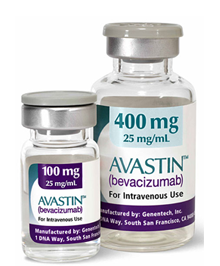Roche Appeals FDA Decision on Avastin
Genentech, owner of Roche, submitted its response yesterday to the FDA’s proposal to withdraw approval for Avastin (bevacizumab) for the treatment of HER2-negative metastatic breast cancer.
Image source: Roche

Last year, based on the results of four clinical studies of Avastin in women with HER-2 negative metastatic breast cancer, the FDA stated that it believes that the drug does not prolong overall survival in breast cancer patients or provide sufficient benefit in slowing disease progression to counterbalance the risk it poses from side effects.
Genentech has a legal right to a hearing to allow "full and fair discussion of the issues in a public forum.” At this hearing, the company will present data and analyses in an effort to demonstrate why Avastin should remain on the market.
Roche has had several setbacks in trying to extend the use of this very lucrative compound: Avastin earned the company nearly six billion last year in its currently-approved indications.Genentech believes that women afflicted with metastatic breast cancer should be allowed Avastin as an FDA-approved choice and that accelerated approval of the drug in combination with paclitaxel should be maintained. The European Medicines Agency has already confirmed that the benefits of Avastin in combination with paclitaxel outweigh the risks and considers this a viable treatment option in women with metastatic breast cancer.
Genentech has said that it will conduct a second trial of Avastin plus paclitaxel in patients with HER2-negative metastatic breast cancer. The trial, the original version of which was used as the basis for the agency's accelerated approval of Avastin, would include a biomarker component designed to identify people who are more likely to experience the greatest benefit from Avastin.
Gedatolisib Combo With/Without Palbociclib May Be New SOC in PIK3CA Wild-Type Breast Cancer
December 21st 2025“VIKTORIA-1 is the first study to demonstrate a statistically significant and clinically meaningful improvement in PFS with PAM inhibition in patients with PIK3CA wild-type disease, all of whom received prior CDK4/6 inhibition,” said Barbara Pistilli, MD.